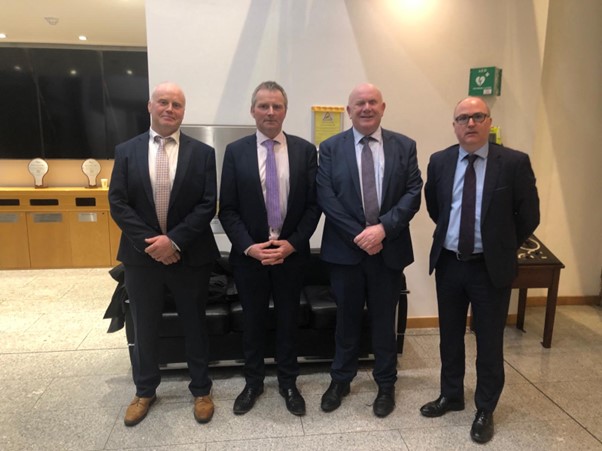ICOS urges Government Action to safeguard the Irish dairy sector and farm families amid Nitrates Derogation Concerns

ICOS told the Joint Oireachtas Committee on Agriculture, Food and the Marine that significant Government intervention is needed to ensure the future viability and environmental sustainability of the Irish dairy sector, as serious concerns continue around the nitrates derogation.
In a comprehensive submission, ICOS addressed a range of questions from the Joint Committee including the economic and social implications of a further reduction to the derogation. The full submission can be viewed in ICOS Reports, Submissions and Guidance Documents.
ICOS President Edward Carr, Dairy Committee Chair Niall Matthews and Agri-Food Policy Executive Eamonn Farrell led the delegation.
Edward Carr emphasised the dairy industry’s unstinting commitment to environmental sustainability and stewardship, telling the committee that “Co-ops and farmers are deeply invested in advancing farm sustainability, with water quality as their foremost concern.”
ICOS is calling for the Government to form an inter-departmental taskforce led by the Department of the Taoiseach. This taskforce would be charged with thoroughly evaluating the economic and social implications of any further reduction to the Nitrates Derogation.
Additionally, ICOS says the Government should commission a comprehensive impact assessment to ‘fully and really’ understand the implications of a further reduction.
Analysis prepared by Professor Michael Wallace of University College Dublin, presented as part of ICOS’s submission, reveals stark economic challenges. This indicates that dairy farms in Derogation Band 3 could face a net margin reduction of -56% or €983/ha due to further derogation limits, thereby challenging their economic viability.
Edward Carr also expressed concern that “a further reduction in the maximum stocking rate would severely compromise the competitive edge of Ireland’s grass-based dairy system,” highlighting the system’s reliance on maximising grass utilisation. Carr stated, “A further reduction to the derogation will drive farmers to a more global, indoor type of dairy production, with unfavourable economic, social and environmental consequences.”
ICOS warned that a reduction in farm profitability and changes to dairy production practices could have profound negative impacts on the downstream dairy processing industry, on sectoral cohesion due to milk supply shortages, and on the broader social and environmental landscape.
Mr. Carr was forceful in calling on the Government to protect investments made by farmers, the processing sector, and the State in the Irish dairy industry by securing the Nitrates Derogation’s future, also voicing concerns about the social effects of derogation reductions on family farms and the need for generational renewal.
“A science-based approach indicates that the time lag between Nitrogen surplus losses and changes to water quality can vary between months to decades, due to groundwater pathways. The Government and European Commission must acknowledge that the range of new actions undertaken by farmers will require time to be implemented.
“We believe that the Government should prepare a strong science-based document, in advance of the next negotiations and with EPA input, similar to the MACC curve for Greenhouse Gas Emissions. This document, and a compelling case, is needed to map out the most effective mitigation measures on a catchment scale and provide realistic time horizons for the actions adopted by farmers.
“Further, ICOS calls on the Join Committee to endorse the Ag Water Quality Working Group’s proposals on slurry storage, including 70% grant aid for farmers. The Government must leverage the new Climate and Nature Fund, announced in Budget 2024, to provide funding for a national slurry storage project, in the context of climate adaptation.”
Strongly emphasising the importance of water quality, Carr highlighted the need to prioritise resources for advisory services, including ASSAP, EIP and the Signpost Farm Programme, thereby supporting compliance, awareness, and education regarding water quality issues.
“Sustainability is our watchword and this must apply in equal measure to environmental priorities as well as the long-term sustainability of livelihoods in rural Ireland and the future sustainable progress of the dairy industry as a key pillar of the Irish economy,” Carr concluded.
About ICOS
The Irish Co-operative Organisation Society (ICOS) is the umbrella organisation for the co-operative movement in Ireland – including dairy processing co-operatives and livestock marts – whose associated businesses have a combined turnover in the region of €16 billion, with some 175,000 individual members, employing 12,000 people in Ireland, and a further 24,000 people overseas. In total, there are some 1,000 co-ops in Ireland, and the largest 100 organisations employ approximately 40,000 people.
ICOS promotes the co-operative model as a means of enhancing the competitiveness, sustainability, and profitability of its members in the agri-food sector.
Ends.